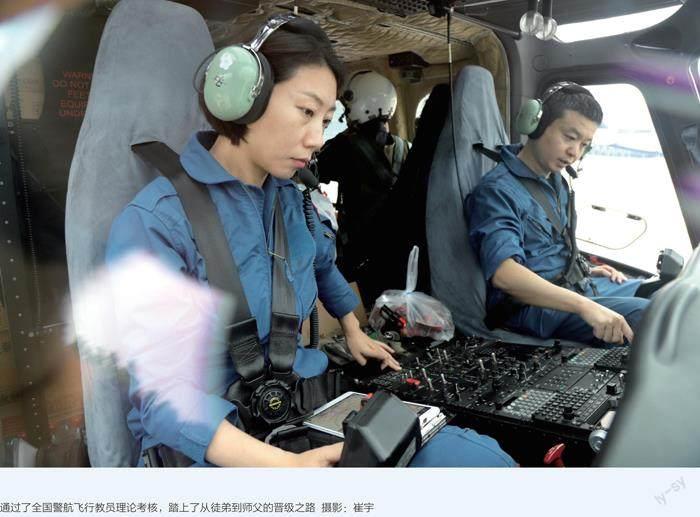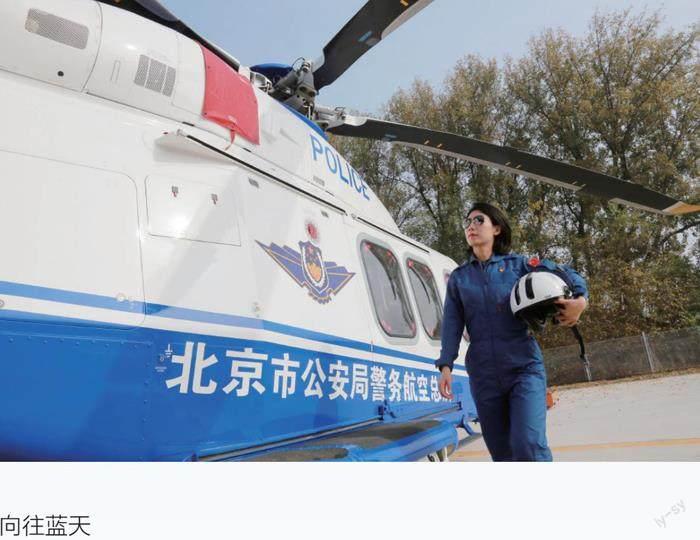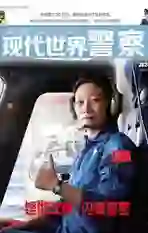翱翔在首都蓝天的女机长
2024-04-28吕品璋
吕品璋



“很多人问我,作为一名警察飞行员有什么不同?我认为没什么不同,如每一位首都警察一样,始终守护着这座城、这些人,只不过有的民警在地面,有的在空中而已。”这是首都警航女机长张明经常挂在嘴边的一句话。
初见张明,一身飞行服搭配齐肩短发,干练利落,说话间透露着沉稳。自2013年加入北京市公安局警务航空总队飛行大队,11年间,张明从一名飞行学员,逐步成长为能执飞多种机型的女机长。截至目前,张明已安全飞行1000余小时。因表现优秀,张明荣获个人三等功1次,个人嘉奖3次。
出发:内勤民警逆袭考入警航总队
2011年研究生毕业后,社会学硕士张明放弃了继续深造的机会,毅然选择从警,成为北京市公安局西城分局国家大剧院派出所的一名民警。
作为派出所里风风火火,直来直去的大嗓门“内勤”,每天按部就班,波澜不惊。在一个偶然的机会,张明得知北京市公安局警务航空总队正在招收“零基础”飞行员。“我想挑战自己,接触不同领域的工作!”回忆起当初的决定,张明依然印象深刻。
但是回家和父母一商量,却碰了一鼻子灰,父母觉得飞行员太辛苦!但张明有自己的想法。“生命中有了新的挑战,我要去战胜它,我觉得我能通过,我想去试试。”一番思索后,张明决定报名。
报名没多久,她就收到了体检通知。第一项是测视力。“飞行员对视力要求很高,不合格的直接就淘汰走人。”紧接着,又经过两轮体检和两轮综合能力测试、一轮心理能力测验和最终的面试。看着身边一个个满怀期待的战友遗憾离开,张明忽然意识到,自己正一步步接近的,是多少人都求之不得的梦想。
2013年2月,张明接到警航总队正式通知,自己成功入选。但是据她回忆,兴奋之余却伴随着担忧:面对一个完全陌生、充满挑战的工作领域,不知道自己能否胜任。
蜕变:从零基础到“空中尖兵”
每一位飞行员,最初都是从几千名候选人中“脱颖而出”的,张明也是如此,但这次入围,却只是“成为飞行员”的小小一步。
想要“上天”,张明还要经历四个月的地面理论学习和军事体能训练,以及九个月的驾驶技术学习。“任何一个环节没能通过,可能都得‘打道回府。”张明回忆说。
同期的其他学员有理工科出身的,有公安院校毕业的。只有张明,文科生,体能基础一般,岁数还最大。这一切都让“零基础”的张明,不得不付出比同期学员更多的努力。
一次次加练,练到小腹爆出了腹肌,练到四肢布满瘀伤;十几门工科领域课程一本一本地“啃”;驾驶技术动作几千次几万次地重复,直至把所有动作生生“磨”成肌肉记忆……
曾经白白净净的张明变得又黑又瘦,晕得直吐时也偷偷抹过眼泪,可她没有认输,一直咬牙坚持着。凭着这股不放弃的劲头,张明顺利通过层层考核,正式进入警航总队,从一个“零起点”的女警成长为女飞行员。
成为警航飞行员后,日常训练的强度,却显得不那么“日常”。仅仅一个“悬停起落航线训练”,就让最初的张明练到“怀疑人生”。“飞行轨迹要呈规定标准的下滑线,下滑轨迹要与地面呈规定的夹角,‘抠这些细节有意义吗?”张明心存疑惑。
但通过海量的训练和实战,最终让她明白,细节对于警航飞行员的意义。在搜索营救、医疗救护飞行中,每快一秒达到悬停要求,就为伤员多抢出一秒化险为夷的生机;在消防灭火飞行演练中,要科学设计取水点与火点之间的往返航线,同时根据气象、火势、地形,准确控制载水量。
最终,张明通过了全国警航飞行教员理论考核,踏上了从徒弟到师父的晋级之路。她用事实证明,女飞行员一样可以成为值得信任和托付的“空中尖兵”。
翱翔:勇担重任守护平安北京
2023年8月,受台风“杜苏芮”影响,北京出现强降雨天气,房山、门头沟等区陆续出现暴雨山洪灾害,陆路交通受阻,极需驰援。
8月2日,张明接到任务,驾驶直升机前往房山区双柳树村投放救援物资。
张明清晰地记得,连续多日的暴雨已停,天空中却仍然阴云密布,水汽蒸腾。这种能见度并不适宜执行飞行任务,但是,洪水冲了桥、断了路,受灾百姓焦急地等待着直升机为他们提供救援帮助。
从昌平基地起飞,沿着六环一路向南,云层不断压低,雾气加重。突然,在白茫茫的雾气中,一条黑漆漆的斜线愈发清晰,竟是一条高压线!“前方有障碍物,通知僚机减速!”由于调整及时,飞机最终在高压线前缓缓悬停了下来。
高压线距张明这一侧更近,为了便于观察,驾驶任务就交给另一位飞行员,张明则紧盯着高压线,给驾驶员指引位置。“高一点……再高一点……停,可以了。”在张明的指挥下,驾驶员一点点拉高飞机,如爬行般缓慢前进。机舱内所有人都捏了一把汗。螺旋桨打着云层,电线杆顶端的铁钉近在眼前,直升机就在这缝隙间穿行而过,安全了!
到达双柳树村后,张明驾驶直升机不断寻找被困群众,然后投下救援物资。“村子里边电线杆比较多,我们当时直升机就贴着电线杆,稍有不慎,就有可能撞上去。”张明说道。物资投放结束后,张明和机组驾驶飞机安全返回基地。
“当时群众受了灾,陆路不通,作为飞行员,我们必须去。但在当时那种天气起飞,作为飞行员,大家都知道意味着什么。”谈起这次任务,张明语气中透出坚定。
从2013年加入警务航空总队,像这种有危险的飞行任务,张明不是第一次经历,多年的飞行历练,让她显得更加从容和沉稳,飞行技术也更加精湛。对于未来,她有一个目标:“飞得更快、飞得更好、飞得更精准。”
曾有人问张明,作为飞行员,你觉得首都的天空什么时候最美?她这样回答:“在空中洒水消灭山火之后,在帮助伤员飞出灾区之时,在受困群众眼含热泪之间,在成功完成空中安保任务归航的路上……首都的天空,最美!”
(责任编辑:张敏娇)
She Pilots Police Planes
By Lv Pinzhang
"I've been asked many times how it's different being a police pilot. But I don't think there's any difference. I'm just the same as any other member of the police force in Beijing, we're all safeguarding this great city. It's just that some members perform their duties on the ground while the others are high up in the sky." Zhang Ming, a female captain of Beijing's police aviation force, often says this.
Zhang has shoulder-length hair and wears a neat uniform. She is decisive and resolute. She joined the pilot squad under the Police Aviation Unit of Beijing Municipal Public Security Bureau in 2013, and the 11 years since have seen her grow from a fresh pilot trainee to a seasoned female captain. She can operate various aircraft, and has flown for more than 1,000 hours to date. Zhang has been honored with four medals of merit.
From Office Work to Police Aviation
After graduating as a postgraduate in sociology in 2011, Zhang gave up a career in academia and joined the police station for China National Center for the Performing Arts, affiliated to the Xicheng Branch of Beijing Municipal Public Security Bureau.
Energetic and straightforward with a loud voice, Zhang did her routine office work diligently every day. One day, she learned the Police Aviation Unit of Beijing Municipal Public Security Bureau was recruiting fresh pilots. "I wanted to challenge myself and start a new role in a different field," she recalls.
Her thought, however, was not echoed by her parents, who believed being a pilot would be too tiring. Zhang mulled it over and resolved to sign up despite her parents' disagreement. "I was going to conquer the new challenge lying ahead in my life, and I was sure that I could make it. I was to give it a shot," she says.
Not long after she signed up, Zhang received a notice to undertake the first test: vision screening. "Perfect eyesight is a must for a pilot, so failing this test will rule you out," Zhang says. After a second health check, two general ability tests, one mental ability test, and a final interview, Zhang saw other candidates fail and leave though they were as keen on the job as she was. It flashed on her that she was moving closer to her dream, enviable to many.
In February 2013, Zhang was notified by the Police Aviation Unit that she was admitted. The exciting news was a source of worry for her: Am I competent in this new, challenging work.
From Fresh Trainee to Top Pilot
Every police pilot is a standout from thousands of candidates, and Zhang is no different. However, passing the selection process is only a small step forward to becoming a licensed pilot.
Zhang had to go through four months of theoretical studies, military physical training, and nine months of flying drills. "Failing in any step means an end to my dream," she recalls.
Her batch mates in the training class either had educational backgrounds in science and engineering, or graduated from public security colleges. However, Zhang majored in social science. Moreover, the oldest one in the class, she has the most room for improvement in physical endurance. All these mean she had to work harder to be a qualified pilot.
She spent more time in physical training every day, enduring bruises all over to improve her muscular strength. She buried herself in a dozen subjects in science and engineering, and repeatedly practised standard flight maneuvers until they became part of her long-term muscle memory.
Long intensive exercises outside gradually tanned her skin and made her thin. The exercise would make her sick and reduce her to tears. This did not deter Zhang. Instead, she grew more tough and determined. With an unyielding spirit, she passed all her exams and was admitted to the Police Aviation Unit, a testimony to her growth from a police officer to a qualified police pilot.
After joining the police pilot force, she found that their ordinary training was not ordinary at all. The "helicopter traffic pattern drills" alone drove her to distraction. "The flight path must follow a standard glide line, and the glide path must form a specified angle with the ground surface. Does it make any sense to focus too much on these details?" Zhang had a lingering doubt.
However, hours of intensive training and practical operations brought her to a full understanding of what details mean to a police pilot. For instance, during search-and-rescue missions, being just one second faster to get the aircraft into the required hovering position will increase the chance of survival for the wounded. In aerial firefighting drills, the route between the nearby water source and the fire location should be designed scientifically, and the load of water should be controlled accurately depending on weather, fire severity, and terrain.
Undeterred, Zhang finally passed her theory exam and became a certified national police aviation instructor. Zhang's journey shows that women pilots are the same as any others, and are worthy of trust. They can also become "top guns" .
Flying High to Safeguard Beijing
In August 2023, Typhoon Doksuri unleashed torrential rains on Beijing, triggering devastating flash floods and mudslides in Fangshan, Mentougou, and other districts. Roads were cut off, and people were desperate for aid.
On August 2, Zhang was tasked with a mission to deliver relief supplies by helicopter to the isolated Shuangliushu Village in Fangshan.
She still has vivid memories of that day. Even though days of heavy rains had ceased, the skies were still dark and threatening with a dense fog shrouding the entire village. The poor visibility posed serious challenges for flying, but Zhang still risked her life to reach flood victims isolated by collapsed bridges and blocked roads. They were in urgent need of necessities.
Zhang and her crew took off from the Changping, flying southwards along Beijing's Sixth Ring Road Expressway. As they headed forward, the dark clouds sank lower and the fog grew thicker. All of a sudden, a vague black line emerged amid a vast expanse of whiteness – a high-voltage cable. "Obstacle ahead, tell the wingman to reduce speed," Zhang said calmly. Thanks to her timely adjustment, the helicopter slowed to a hover just in front of the looming cable.
With the cable on her side, Zhang handed piloting duties to the co-pilot while she closely monitored the situation and provided guidance. "Higher...a bit more...stop, hold position." Following her prompts, the co-pilot gently pulled up the helicopter as if they were crawling forward. Everyone in the cabin was sweating due to the tension. With the spinning rotors churning the clouds, the helicopter barely avoided hitting the top of the cable pole and finally passed through a narrow passage to safety.
After reaching the village, Zhang and her crew searched for the trapped villagers and dropped relief supplies. "Telegraph poles were everywhere around the village, and our low-flying helicopter was very close to these poles. Any mistake could mean a deadly crash," Zhang says. However, Zhang and her crew managed to fly their aircraft back to the base safely after accomplishing their rescue mission.
"With the residents stranded and roads destroyed, we police pilots are obliged to help. But everyone was aware of the potential danger," Zhang spoke of the mission, firmly yet evenly.
That was not the first time that Zhang had performed such a dangerous mission since she joined the Police Aviation Unit in 2013. Years of flying experience have sharpened her pilot skills and equipped her to handle the helicopter in a composed manner. She has set a goal for her future: "To fly faster, better, and more precisely."
Once asked what was her most beautiful memory of the sky in Beijing, she replied: "It's when we managed to extinguish wildfires from the air, when we succeeded in transferring the wounded out of affected areas, when we saw grateful tears brimming in the eyes of rescued people, and when we were on the way back from air policing missions."
(Translated by Zhang Yanzhou)
